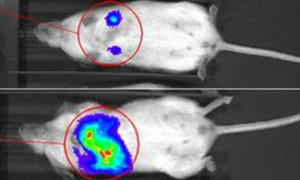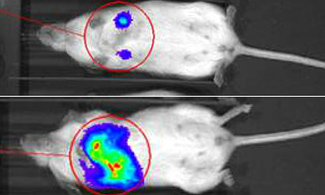
UBC13 – a new STOP sign for breast cancer metastasis
Breast cancer is the most common type of cancer afflicting American women and their second-leading cause of death, according to the American Cancer Society. The invasive forms of breast cancer are characterized by its ability of growing into healthy tissue. Once cancer cells reach the bloodstream or lymphatic system, they can promote breast cancer metastasis, i.e., the spread of the primary tumor to other body parts. Cancer lethality is related to this spread from the primary tumor.
In the current issue of PNAS, a team of researchers at the University of California, San Diego School of Medicine found a new pathway regulated by an enzyme, UBC13, that targets breast cancer metastasis. The findings are posted in an article entitled, “Ubiquitin-conjugating enzyme Ubc13 controls breast cancer metastasis through a TAK1-p38 MAP kinase cascade.”
UBC13 was already reported to have an important role in regulating normal cell growth and a functional immune system. Now, a new link between UBC13 and the spread of breast cancer has been established.
Wu and colleagues at the UC San Diego Moores Cancer Center found that breast cancer cells express up to three times the levels of UBC13 of healthy cells. Specifically, they found that this enzyme can regulate cancer cells signals to promote cell growth and survival through the activity of p38 protein. When the expression of p38 is “knocked down” metastasis formation is prevented.
The team injected into the mammary tissues of mice breast cancer cells where the expression of both UBC13 and p38 proteins was silenced, via a lentivirus system. Notably, although they induce the growth of the primary tumor, no metastases were formed.
[adrotate group=”3″]
Lead author of the study, Xuefeng Wu, PhD, noted: “The real danger is cancer cells that have successfully left the primary site, escaped through the blood vessels and invaded new organs. It may be only a few cells that escape, but they are aggressive. Our study shows we may be able to block these cells and save lives.”
Of important clinical note, a compound that inhibits the activation of p38 is currently under evaluation for the treatment of rheumatoid arthritis.
These findings define a metastasis gene signature, which will also be significant in the evaluation of the efficacy of cancer therapies that target metastatic pathways.

